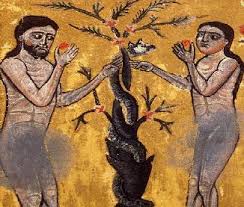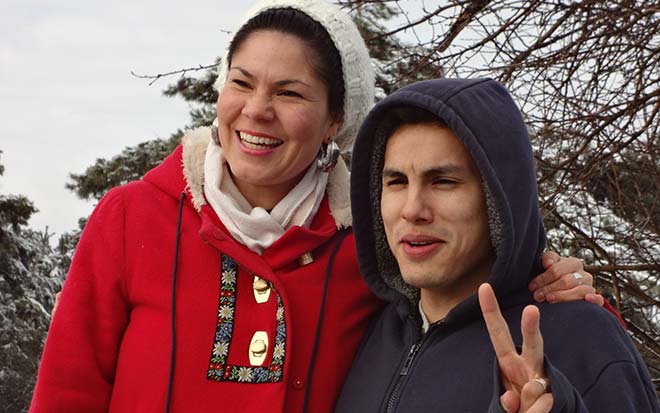| Posted March 23, 2017 | By Allan Effa, PhD, Professor of Intercultural Studies, Taylor Seminary, Edmonton, Canada | Categorized under Missiology and Praxis |
The Nitty Gritty Mission of Reconciliation
It has become a standard missiological practice to frame the Missio Dei around the four alienations described in Genesis 3. Our blueprint for mission encompasses the reconciliation of people to God, to themselves, to one another, and to creation. Each of these represents an enormous challenge that looks different, depending on where you find yourself.
I have been pondering the second of these in light of my Canadian urban context.
As the story go es, Adam and Eve's disobedience resulted in a blanket of shame, signified by their hiding and make-shift attempts to cover their nakedness. Suddenly they were no longer at ease with their physical bodies and their psyches were marred with guilt and shame.
es, Adam and Eve's disobedience resulted in a blanket of shame, signified by their hiding and make-shift attempts to cover their nakedness. Suddenly they were no longer at ease with their physical bodies and their psyches were marred with guilt and shame.
The pursuit of improved image, beauty, status, possessions, and an unhealthy clinging to others for affirmation are manifestations of this curse. Media projects the ideal physique, the preferred image, and what success should look like. Reality TV shows glamorize radical makeovers and clinics market cosmetic surgeries to rearrange face or figure, reinforcing the drive to remedy this self-estrangement and satiate the longing for wholeness.
Besides being a plague among Canadian youth, generally, two specific groups are negatively affected in even more acute ways. One of these populations is a visible minority that has experienced centuries of racial and cultural discrimination . These are the aboriginal peoples of Canada. For decades, residential schools were an instrument of cultural genocide, a concerted effort by church and state to stamp out cultural identity. Children were removed from their families at young ages, forbidden to speak their languages, and were educated toward becoming productive white citizens. Instead of being agents of reconciliation, the church became a force of alienation, encouraging aboriginal children to despise their "indianness" and aspire to take on the identity of the Caucasian majority. An aboriginal member in my congregation recalls the deep childhood shame she felt over her dark skin and her avoidance of direct sunlight in the summer time, lest she take on even darker shades of pigment than her white classmates.
. These are the aboriginal peoples of Canada. For decades, residential schools were an instrument of cultural genocide, a concerted effort by church and state to stamp out cultural identity. Children were removed from their families at young ages, forbidden to speak their languages, and were educated toward becoming productive white citizens. Instead of being agents of reconciliation, the church became a force of alienation, encouraging aboriginal children to despise their "indianness" and aspire to take on the identity of the Caucasian majority. An aboriginal member in my congregation recalls the deep childhood shame she felt over her dark skin and her avoidance of direct sunlight in the summer time, lest she take on even darker shades of pigment than her white classmates.
Only in recent years, within the framework of Canada's truth and reconciliation commission, has the church begun to address this deep-seated alienation that continues to manifest itself in Canada's many social problems. There are still large segments of the Canadian church that fail to see this dimension of reconciliation as integral to their mission.
Another minority group that acutely experiences alienation toward self is the gay/lesbian/transgendered community. Despite progress in laws protecting human rights and a significant shift in the attitudes of the Canadian population as a whole, much of the Canadian church continues to be a greater force for alienation than reconciliation. Teen suicide rates are high in Canada, but LGBT teens and young adults are four times more likely to commit suicide than their straight peers. Twenty percent of homeless youth are LGBT, many of them evicted by their church-going families. This brokenness, too, forms part of God's agenda of reconciliation.
Unfortunately, most churches have been a complete failure in this arena. The primary words LGBTs in Canada hear from the church are words of condemnation. My denomination (Canadian Baptists of Western Canada) has an official position of "Welcoming, but not Affirming" toward LGBT people. Although the "not affirming" label is intended to communicate that we do not affirm gay marriage, the common reaction of sexual minorities is that these churches are not affirming any identity apart from traditional heterosexuality. Regardless of where churches may land on the matter of same sex relationships, there is convincing evidence that sexual orientation and gender dysphoria are not chosen behaviours, but determined by some still unknown factors. Too often we emit messages of disapproval to people who identify as LGBT, offering them either the option of trying to change who they are or to live as though they were heterosexual (sometimes with painful relational consequences). We continue to impose the same kinds of failed options that we did upon our aboriginal populations: change or assimilate. I am not interested in staking a position in favour or against gay marriage or same sex relations. This is a divisive issue on which the church needs to learn to peacefully agree to disagree. But, we are all compelled by Christ's love to offer acceptance, home, and spiritual community that can help heal the wound of alienation to self that these brothers and sisters live with.
words of condemnation. My denomination (Canadian Baptists of Western Canada) has an official position of "Welcoming, but not Affirming" toward LGBT people. Although the "not affirming" label is intended to communicate that we do not affirm gay marriage, the common reaction of sexual minorities is that these churches are not affirming any identity apart from traditional heterosexuality. Regardless of where churches may land on the matter of same sex relationships, there is convincing evidence that sexual orientation and gender dysphoria are not chosen behaviours, but determined by some still unknown factors. Too often we emit messages of disapproval to people who identify as LGBT, offering them either the option of trying to change who they are or to live as though they were heterosexual (sometimes with painful relational consequences). We continue to impose the same kinds of failed options that we did upon our aboriginal populations: change or assimilate. I am not interested in staking a position in favour or against gay marriage or same sex relations. This is a divisive issue on which the church needs to learn to peacefully agree to disagree. But, we are all compelled by Christ's love to offer acceptance, home, and spiritual community that can help heal the wound of alienation to self that these brothers and sisters live with.
We need to take up the mission of reconciliation by helping both our aboriginal and LGBT brothers and sisters come to a place where they can stop hating the way they were made and affirm with the psalmist, "I praise you because I am fearfully and wonderfully made. Wonderful are your works; that I know very well" (139:14). This is the nitty-gritty work of mission.